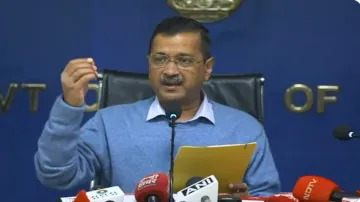Delhi government introduces new Solar Policy 2024, THESE consumers to get 'zero electricity bills'
'Delhi Solar Policy 2024: Around 20 per cent of Delhi's electricity consumption will come from solar power by 2027 - one of the highest in India. The government is likely to spend Rs 570 crore for the policy implementation.

Delhi Solar Policy 2024: Chief Minister Arvind Kejriwal launched the 'Delhi Solar Policy 2024' on Monday, announcing that domestic consumers will enjoy zero-cost electricity bills, and the tariff for commercial and industrial consumers will be slashed by half upon the installation of rooftop solar panels. As per the new policy, residential consumers can potentially earn Rs 700-900 per month by installing rooftop solar panels as the government has proposed to provide Generation-based Incentives (GBI).
Key points of Delhi Solar Policy 2024
Additionally, the Delhi government's existing power subsidy scheme ensures that residential consumers, using up to 200 units of electricity per month, receive a zero-cost bill, with a 50 per cent subsidy on electricity consumption between 201 and 400 units. Addressing a press conference, Kejriwal highlighted that the solar power generated effectively offsets the electricity consumed by the grid. Elaborating on the specifics of the new solar policy, he explained that if an individual consumes 400 units of electricity and generates 225 units through solar power, they will receive a zero-cost bill. This is because their net consumption, after factoring in solar generation, falls under 200 units, which is fully subsidised in the national capital.
"This was considered to be the most progressive solar policy in the country. Under the policy, the rooftop solar panels installed by the people in Delhi have an installed capacity of 250 MW of electricity. Besides this, various discoms in Delhi purchased 1250 MW of solar power from outside Delhi. So, in total, 1500 MW of solar power was made available under the policy. We all know that solar power reduces air pollution," the CM remarked.
Aims of Delhi Solar Policy 2024
Kejriwal further said the aims of Delhi Solar Policy 2024 are to reduce Delhi's air pollution and help fight inflation by bringing the electricity bills of non-subsidized residential consumers to zero and for commercial/industrial consumers to 50 per cent of their current bill. Power Minister Atishi and the Vice Chairperson of the Dialogue and Development Commission of Delhi, Jasmine Shah, were also present at the press conference.
The Chief Minister said as of now, the Delhi government gives 200 units of electricity free (fully subsidised) to residents and gives a subsidy of 50 per cent to those residential consumers who consume 201 units to 400 units a month (partly subsidized) and for those with consumption above 400 units a month, there is no subsidy. "But electricity bills of all residential consumers who install solar panels on their rooftops by opting for this policy will be zero, no matter how much electricity they consume. That is the most important takeaway of the policy," he added.
About the Delhi Solar Policy 2024
Under the policy, all government buildings having an area of 500 square metres will have to mandatorily install rooftop solar panels in the next three years. At present, Delhi's solar power capacity is around 1,500 MW, including 250 MW from rooftop plants. the government has targeted to increase the total installed solar capacity of Delhi to 4,500 MW by March 2027, three times the existing capacity. Around 20 per cent of Delhi's electricity consumption will come from solar power by 2027 - one of the highest in India. he government will spend Rs 570 crore for the policy implementation.
The Delhi government will also provide a capital subsidy of Rs 2,000 per kW to residential consumers for installation of up to a maximum of Rs 10,000 per consumer. This will be over and above the capital subsidy of the central government, the chief minister said. In addition, they will get a monthly income of Rs 700-900 through the Delhi government's GBI and a total return on investment (ROI) in four years.
The Delhi Solar Policy 2024 also comes up with some innovative deployment models like community solar for consumers who have constraints of funds or rooftop space. For the first time in the country, a community solar model will be put in place under the policy, the Delhi government added.
(With inputs from agencies)
ALSO READ: President denies approval to Delhi Electricity Reforms (Amendment) Bill 2022: Here's why